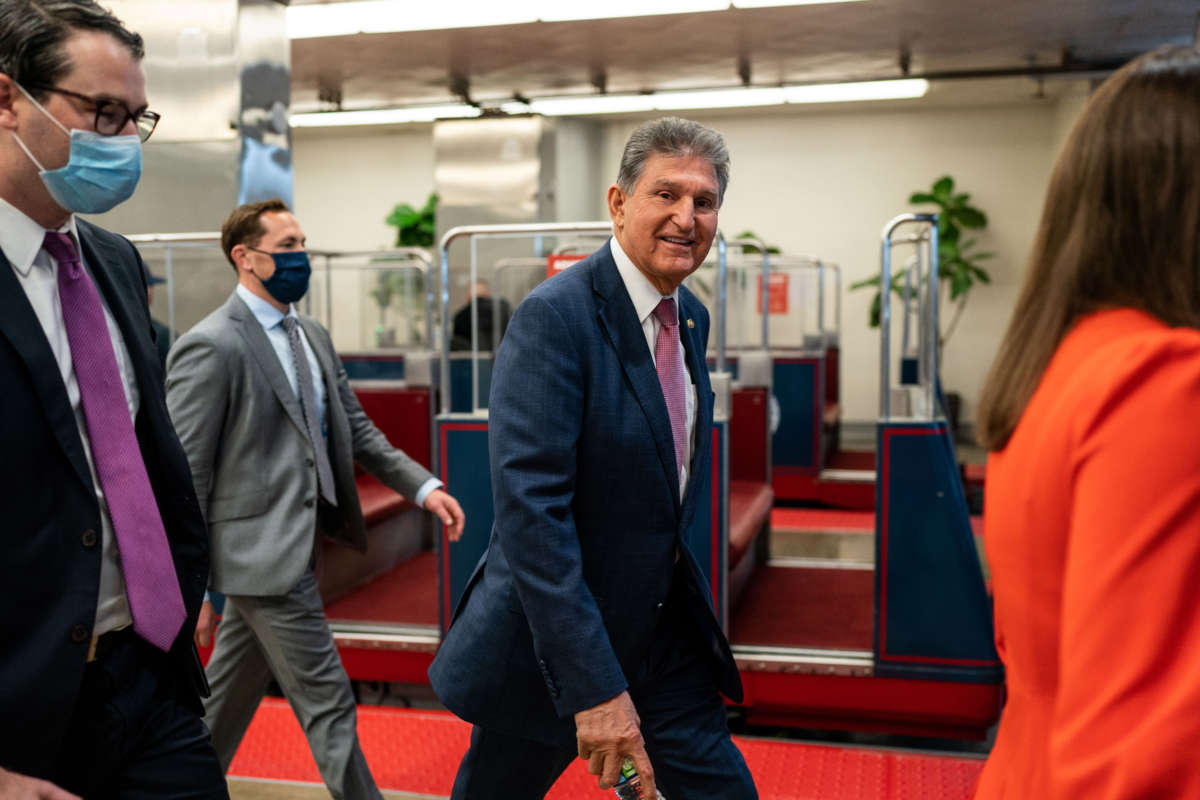Coal baron Sen. Joe Manchin (D-West Virginia) recently appeared as a key speaker at a secretive, invite-only coal leadership forum — and shortly after attending, he made massive cuts to the climate portion of the Build Back Better Act.
The Coal and Investment Leadership Forum, uncovered by Documented, was held September 19 to 21 and listed at least 21 coal industry CEOs in attendance. The invitation touted Manchin and Sen. Shelley Moore Capito (R-West Virginia) as “headliners” for the event, along with what appears to be an all-white, all-male list of hosts from various fossil fuel companies. Tickets to the event cost $7,000 per person, not including lodging at the golf resort in Virginia.
In a promotional video for the event, the CEO of Olde Farm, where the event was held, emphasized Manchin and Capito’s participation in the forum. “You’d be hard pressed to really find two more influential people in politics in the United States right now,” he said. The event was promoted as “a private, invitation-only conference focusing on the challenges and opportunities facing coal and energy around the globe today.”
Other keynote speakers from the weekend included coal CEO Joe Craft of Alliance Resource Partners and infamous climate denier Chris Horner, who is tied with the Koch family-funded Heartland Institute and often cited in far-right documentaries and books for his supposed expertise as a climate denier. Horner has called people who want to address the climate crisis “authoritarians,” and expressed sympathy for those who participated in the January 6 attack on the Capitol this year.
According to the participant list, other attendees of the event include Credit Suisse investment banker Douglas Pierson, UBS Private Wealth Management Senior Vice President Matthew Giugliano, and Andrew Frame, managing director of investment banking company Evercore. As Documented points out, Frame’s company is currently working for coal giant Murray Energy as it goes through bankruptcy.
Manchin’s attendance at this event only further confirms the senator’s deep ties to the coal industry. In the 1980s, Manchin launched two coal firms of his own, which have made him over $4.5 million in the 11 years he’s been in the Senate, on top of his $174,000 Senate salary. The coal baron and climate denier still holds stock options in Enersystems, Inc., which are valued between $1 million and $5 million; he’s also made claims that fossil fuels must remain a part of the energy mix to address the climate crisis.
Of course, coal is the most carbon-intensive fossil fuel in use — and on top of Manchin’s own personal wealth being staked in the success of the coal industry, he also enjoys a cozy relationship with fossil fuel lobbyists. Over the summer, an Exxon lobbyist bragged about his weekly conversations with Manchin’s office as he was negotiating the bipartisan infrastructure bill. The bipartisan group of senators, co-led by Manchin, ended up carving climate out of the bill nearly entirely.
Just weeks after the October forum, Manchin began slashing climate proposals from the reconciliation bill as well. Manchin chairs the Senate Energy and Natural Resources Committee and is thus responsible for crafting the climate portion of the bill, despite the fact that this is a blatant conflict of interest.
Last month, the lawmaker eliminated the Clean Energy Payment Program from the bill, which was designed to substantially reduce carbon emissions. Analyses have revealed that without the Clean Energy Payment program, 20 to 35 percent of the emissions reductions aimed for will be completely off the table.
Though Manchin has drastically cut the reconciliation plan, hacking the price tag for social and climate proposals in half, he complained on Monday that his fellow lawmakers aren’t compromising enough. Of course, Manchin, who originally wanted a paltry $1.5 trillion for the bill, has only had to give up an extra $250 billion, while progressives have had to negotiate trillions of dollars off of their original proposals.
Join us in defending the truth before it’s too late
The future of independent journalism is uncertain, and the consequences of losing it are too grave to ignore. To ensure Truthout remains safe, strong, and free, we need to raise $43,000 in the next 6 days. Every dollar raised goes directly toward the costs of producing news you can trust.
Please give what you can — because by supporting us with a tax-deductible donation, you’re not just preserving a source of news, you’re helping to safeguard what’s left of our democracy.
